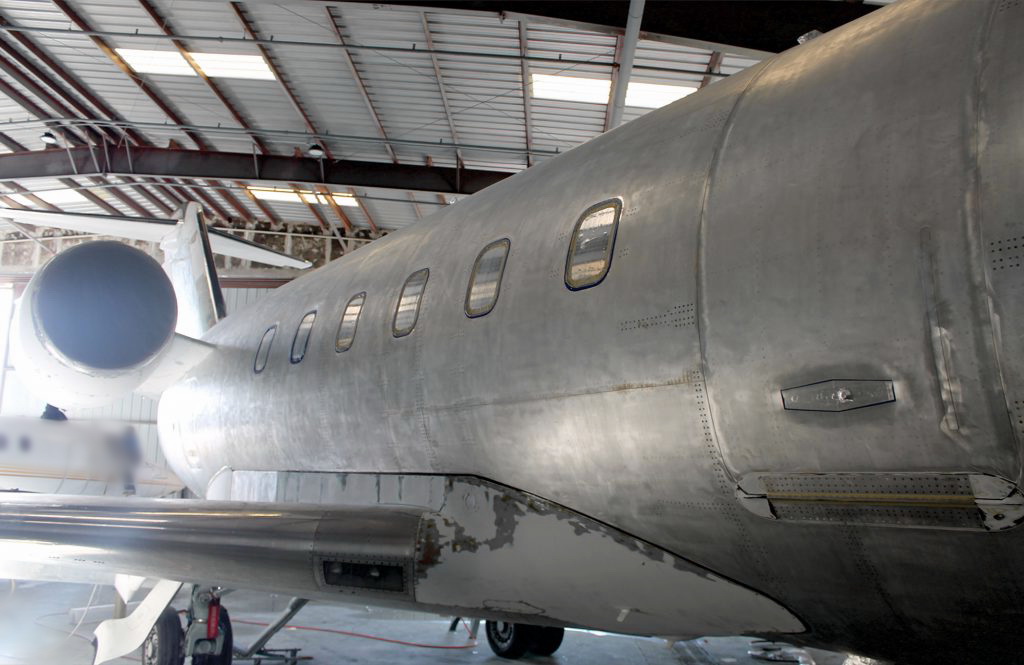Airplanes give a feeling of invincibility with their smooth and sleek exteriors. But under their silky surface is a constant lurking threat—rust. In the aerospace industry, rust is a silent enemy. It develops due to the continuous exposure of aircraft to harsh environmental conditions. These conditions include moisture, sunlight, and poor maintenance of the airplane. When the delicate components of these machines get contaminated, probable fatal issues arise. These issues affect the integrity and performance of aircraft. In turn, these issues compromise the general safety of these vehicles. This is detrimental to the aerospace sector, which prioritizes safety and precision. Hence, the industry uses lasers to remove rust from these vehicles as a cleaning solution.
Laser cleaning is a precise and effective method of removing impurities from surfaces. In aerospace, they are perfect for cleaning difficult areas that need delicate handling. This post will explore how laser cleaning machines influence the aerospace industry.
Applications of Laser Rust Removal in Aerospace
Laser cleaning is a versatile process with many uses in the aerospace industry. It removes rust with precision while leaving the surrounding metal intact. This technology offers a safe and effective solution to rust that other methods lack. In aerospace, its applications involve the following.
1. Airframe Maintenance:
The airframe of an aircraft is like its skeleton, holding everything in place. Its main parts include the landing gear, fuselage, and wing spars. Together, these components work to maintain the vehicle’s structural integrity. So, when rust occurs in any of these areas, it weakens them and compromises general safety.
To clarify, rust build-up in the landing gear affects its functionality. The spars shape the wings and support the weight of the aircraft. The fuselage is the main body and houses both cargo and passengers. Therefore, the effects could be disastrous when impurities contaminate any of these components.
This is where laser rust removal comes in. Laser cleaning provides a controlled solution to removing rust from these components. It reaches intricate nooks and crannies without damaging the delicate mechanisms. It is an ideal rust-removing solution in the aerospace sector.
2. Cleaning the Engine:
The engine is an airplane’s heart. It propels the vehicle through the air, and its performance is crucial for its safety and operation. However, due to constant use, rust can build up on vital engine components, including the turbine blades and combustors, reducing their performance.
To generate thrust, the turbine blades spin at incredible speeds. In tandem, the combustion chambers burn fuel to generate power. Rust on these structures makes them heavy and affects their balance and efficiency. The result is reduced engine power, incomplete burning, and increased fuel use.
A laser rust removal tool solves these problems. It eliminates rust from the blades and combustion chambers without harming their structures. The process of rust removal is fast, efficient, and safe for both the aircraft and the handler.
3. Regular MRO (maintenance, repair, & overhaul) Checks:
Cars and other automobiles need regular checkups, as do aircraft. Aeroplanes, jets, etc, demand careful MRO procedures to ensure airworthiness. Laser rust removal plays a vital role in these procedures. This cleaning method helps inspect potential concerns before they worsen.
Using a laser cleaning machine to remove rust exposes the metal hiding underneath. This reveal allows mechanics to conduct a thorough checkup for any hidden issues. Laser cleaning also helps to prepare the surface for welding & bonding during repair. This process removes rust and other impurity build-up from the aircraft’s surface. This further results in a clean, smooth surface that ensures a long-lasting repair.
4. Surface Preparation:
The chances that you’ve ever seen an unkept airplane are probably zero. Airplanes sometimes require a fresh coat of paint to look their best. Aesthetics aside, the paint protects them from the elements while in the air.
But before applying paint, the surface of an aircraft must be spotless. Laser cleaning acts as a super-powered brush that removes rust from the surface. Apart from rust, this method removes other dirt and grime that stop the paint from sticking. It ensures that the paint job is flawless and long-lasting. The paint keeps the plane looking sharp and protected from the elements.
Concluding Remarks
While airplanes seem flawless, the threat of rust lurks under their shiny surfaces. Fuelled by harsh environments, rust weakens various parts of the aircraft. This weakening compromises the safety and performance of our flying machines.
The traditional rust-removing methods come with drawbacks that cause bodily harm. Many of these methods release toxic waste that damages the environment.
Laser rust removal emerges as a game-changer for these downsides. It offers a precise and practical approach to removing rust from various parts of an aircraft. This innovative technique allows the aerospace sector to protect the integrity of our planes and help guarantee that air travel is safe, efficient, and worthwhile.


